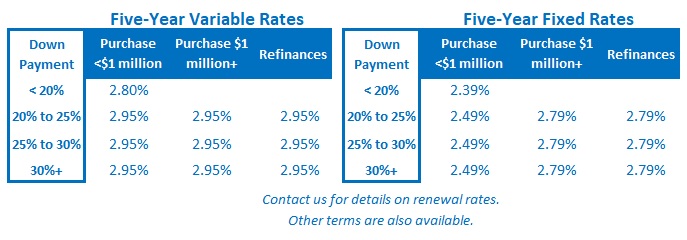The Bank of Canada’s Surprising Announcement
September 9, 2019Why the Bank of Canada Will Likely Match the Fed’s Next Rate Cut
September 23, 2019
When the Bank of Canada (BoC) met on September 4, the Government of Canada (GoC) five-year bond yield stood at 1.12%, which marked a 52-week low.
At the end of that meeting the Bank surprised market watchers when it released a more bullish than expected policy statement, and since then, our bond yields have moved steadily higher. To wit, the five-year GoC bond yield closed at 1.51% last Friday after its sharpest five-day increase in well over a year.
While on first pass the cause and effect of our recent bond-yield surge may seem clear, a closer look suggests otherwise.
Consider that on September 4, the five-year U.S. treasury bond yield stood at 1.30%, which was also a 52-week low. By close of business last Friday, it had surged even higher than its GoC equivalent, closing at 1.75%.
In case anyone needs reminding, GoC bond-yield movements are highly correlated with U.S. bond yield movements, and with that in mind, our recent spike likely has more to do with changes in the U.S. outlook than with the stubbornly hawkish BoC.
Here is a summary of recent developments south of the border, along with my take on how material they will ultimately prove to be:
- Trade war optimism: U.S. President Trump agreed to postpone a tariff hike on $250 billion worth of Chinese imports that was due to take effect on October 1, while China agreed to exempt some U.S. imports from tariffs and to increase its purchases of U.S. agricultural goods. While these are encouraging signs, it is worth remembering that financial markets have tended to over-react to any positive developments in the U.S./China trade war and that the countries remain far apart (and well entrenched) on a long list of key issues.
- Improving economic data: We recently learned that average U.S. hourly earnings rose by 0.4% in August, and are now up by a 3.2% year over year. U.S. retail sales for August also rose 0.4%, which was higher than expected, and the latest University of Michigan consumer sentiment index also came in above consensus. The U.S. consumer drives about 70% of overall U.S. economic activity so these recent data are fueling a rise in investor optimism. As investors become more positive about the U.S. economy’s prospects, they sell safe-haven assets, like government bonds (which reduces their yield), and buy equities instead. For now.
- Rising core inflation: U.S. core inflation, which strips out the more volatile inputs that affect overall inflation, came in at 2.4% in August. That’s the highest it’s been since the start of the Great Recession. If investors believe that U.S. inflationary pressures are rising, they will demand higher interest rates on bonds to preserve their expected returns after inflation. They should note, however, that core inflation has been unusually boosted both by Trump’s tariffs, and by particularly low bases of comparison from the prior year. Also, overall U.S. inflation fell from 1.8% in July to 1.7% in August, and at its last meeting the Fed reiterated its concerns about stubbornly low inflation.
- Fewer expected rate cuts – The U.S. futures market reduced the odds of a 0.50% rate cut by the U.S Federal Reserve at this week’s meeting from 45% to 20%, and is now pricing in only two quarter-point cuts over the remainder of 2019 (down from three a few weeks ago). Longer term bond yields are also being recalibrated by the market to account for a higher-than-expected policy rate. Again, for now. (I continue to believe that the Fed will cut by more than is generally expected over the medium term.)
The U.S. economy impacts ours more than any other, but every country is also affected by global economic momentum. To that end, there are still more than $15 trillion USD worth of global bonds trading at negative yields. Last week, European Central Bank (ECB) President Mario Draghi cut the ECB’s policy rate to a record low of -0.50% and pledged that it would remain there until the Bank has seen inflation “robustly converge” towards its 2% target. The ECB also pledged to continue its bond purchase program (which drives down euro zone yields) “for as long as necessary to reinforce the accommodative impact of its policy rates.”
All of that will exert downward pressure on the yields of safe-haven bond yields that still have positive rates (U.S. and Canadian alike). As will any geopolitical flare up, especially at a time when there are many to choose from. (The attack on critical oil facilities in Saudi Arabia provides the latest example.)
What does all of this mean for fixed-rate mortgage borrowers?
Interestingly, most Canadian lenders haven’t moved their fixed mortgage rates higher as yet.
That’s surprising because our fixed mortgage rates typically take the elevator when they rise and the stairs when they fall (and a 0.39% spike in the five-year GOC bond yield would normally be more than enough reason to raise).
The delay may be in part because gross lending spreads were wider than normal before the recent bond yield run-up began, giving lenders more buffer to work with. But I also wonder if they may be betting that yields will fall back down in short order.
(Most lender rate meetings happen on Monday, so their answer may be forthcoming.)
The Bottom Line: The recent surge in the five-year GoC bond yield means that five-year fixed mortgage rates will likely increase over the short term. That said, for the reasons outline above, I think that any run-up in yields won’t be sustained. If I’m right, borrowers who need to secure an approval today should check their mortgage contract to confirm whether their lender will lower their rate if it drops in the time between when they are approved and when their deal closes. (Only some will.)








